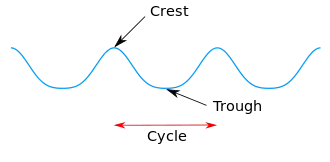Crest and trough
A crest point on a wave is the maximum value of upward displacement within a cycle. A crest is a point on a surface wave where the displacement of the medium is at a maximum. A trough is the opposite of a crest, so the minimum or lowest point in a cycle.

When the crests and troughs of two sine waves of equal amplitude and frequency intersect or collide, while being in phase with each other, the result is called constructive interference and the magnitudes double (above and below the line). When in antiphase – 180° out of phase – the result is destructive interference: the resulting wave is the undisturbed line having zero amplitude.
See also
References
- Kinsman, Blair (1984), Wind Waves: Their Generation and Propagation on the Ocean Surface, Dover Publications, ISBN 0-486-49511-6, 704 pages.
This article is issued from Wikipedia. The text is licensed under Creative Commons - Attribution - Sharealike. Additional terms may apply for the media files.